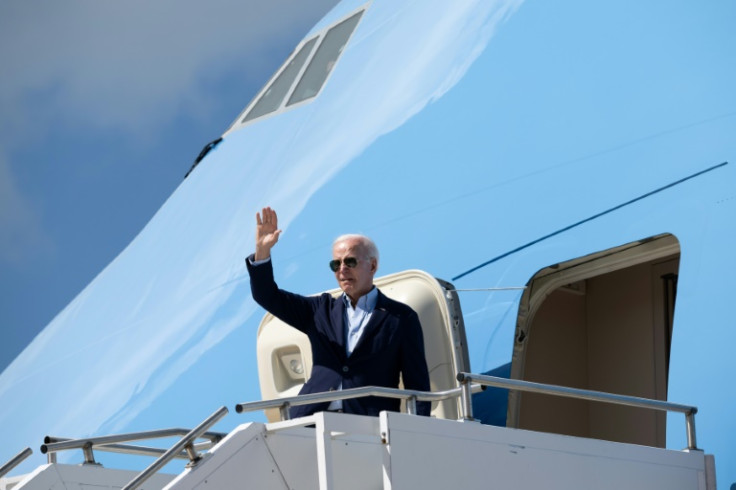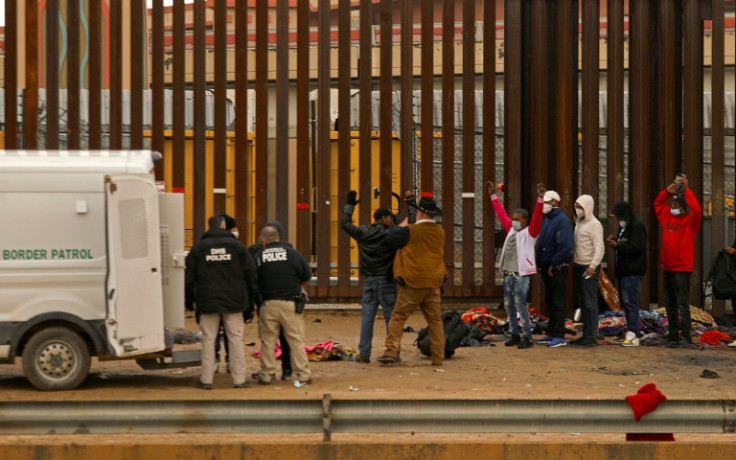Migrants, Drugs On Agenda As Biden Heads To Mexico

US President Joe Biden will seek Mexico's help tackling illegal flows of migrants and drugs, particularly deadly opioids, during a visit beginning Sunday for a North American leaders' summit.
Aiming to tame criticism over what he has called a "broken" immigration system, Biden will stop off in Texas for his first trip to a border overwhelmed by record numbers of migrants and asylum-seekers.
The issue is almost certain to top the agenda when Biden meets Mexican President Andres Manuel Lopez Obrador on Monday, a day before Canadian Prime Minister Justin Trudeau joins them for the so-called "Three Amigos" summit.
Another priority for Biden is stepping up joint efforts to fight trafficking of fentanyl and other drugs behind an addiction crisis in the United States.
"Mexico is extremely relevant and important in dealing with both acute issues, which have become political vulnerabilities for Biden," Michael Shifter, a senior fellow at the Inter-American Dialogue think tank, told AFP.
On Thursday, Washington announced that up to 30,000 qualifying migrants a month would be allowed into the United States from Cuba, Haiti, Nicaragua and Venezuela if they arrive by plane.
The quota will be restricted to those who already have a US sponsor, while those attempting to cross the border illegally will be expelled in coordination with Mexico.
The International Rescue Committee humanitarian group warned that the new measures "will only push more asylum-seekers into dangerous situations, the likes of which have already been seen in the form of mass kidnappings across northern Mexico."
Flows of migrants fleeing violence and poverty in their countries are a major challenge for Mexico, whose border has become a revolving door for people trying to cross to the United States.
Thousands of people are stranded in Mexico because of the controversial Title 42 rule implemented under ex-president Donald Trump's administration, ostensibly as a health measure to reduce the entry of people during the Covid-19 pandemic.
On drug trafficking, Biden will seek Mexico's assistance stemming inflows of fentanyl, a synthetic opioid 50 times more powerful than heroin.
Mexican cartels are major players in production and trafficking of fentanyl, which the US Drug Enforcement Administration (DEA) describes as the "deadliest drug threat" facing the United States.
In 2022 alone, more fentanyl was seized than would be needed to kill the entire population of the United States, according to the US agency.
Washington is "making strides" with its partners to seize illicit opioids and other drugs, US National Security Council spokesman John Kirby said ahead of Biden's trip, his first to Mexico as president.
"It's an ongoing effort. It's not something you can ever take your foot off the gas on," he added.
In 2021, the United States and Mexico announced a revamp of their fight against drug trafficking to address the root causes and step up efforts to curb cross-border arms smuggling.
Lopez Obrador wants Washington to invest in regional economic development instead of sending helicopter gunships and other weapons to take on drug traffickers.
Mexico is plagued by cartel-related bloodshed that has seen more than 340,000 people murdered since the government deployed the military in the war on drugs in 2006.
Days before Biden's visit, Mexican security forces captured a son of the notorious drug kingpin Joaquin "El Chapo" Guzman, who is serving a life sentence in the United States.
The United States had offered a reward of up to $5 million for information leading to Ovidio Guzman's arrest, accusing him of being a key player in the Sinaloa cartel founded by his father.
The timing was more than a coincidence, according to some analysts.
"When there are these types of meetings (between presidents), the Mexican authorities always have something to offer," said security expert Ricardo Marquez.
Climate change and cooperation in clean energy technologies will also be on the summit agenda, with Mexico hoping to benefit from Washington's efforts to reduce its reliance on Asia-based manufacturers.
The aim is to "work together to strengthen and expand North American supply chains for semiconductors, critical minerals and electric vehicle batteries," said senior US diplomat Brian Nichols.


© Copyright AFP 2024. All rights reserved.





















